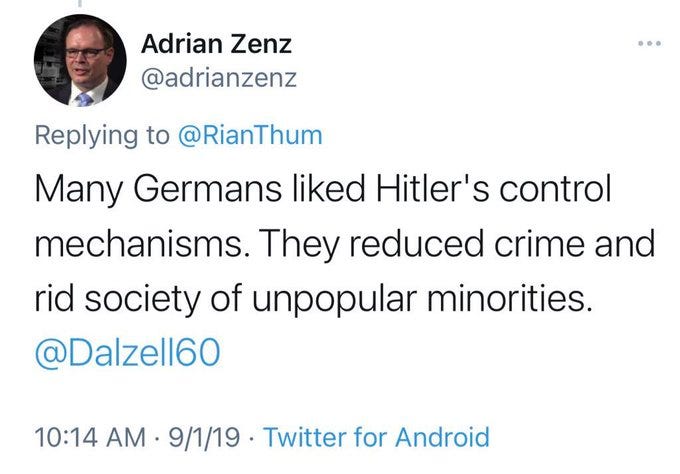Adrian Zenz: A Pseudo-"Expert" on Xinjiang's Uyghurs
Examining Adrian Zenz's Questionable Methods and Controversial Views on Xinjiang, Religion, and Race
Adrian Zenz, a German researcher and self-proclaimed China expert, has been at the forefront of promoting claims of genocide and other human rights abuses against Uyghur Muslims and other ethnic and religious minorities in Xinjiang, China. While Zenz's research and claims have been widely publicized and have led to significant international attention and criticism, some scholars and experts have raised concerns about the accuracy and validity of these claims and Zenz's role in promoting them.
One aspect that has drawn criticism is Zenz's affiliation with the Victims of Communism Memorial Foundation (VOC), an organization based in Washington, D.C. that focuses on the history and legacy of communism. The VOC was founded by an Act of US Congress, and shares certain members of staff with the National Endowment for Democracy (NED), a U.S.-based nonprofit organization that claims to promote ‘democracy’ and ‘human rights’ globally and exists to do overtly what the CIA used to do covertly. There are major concerns regarding the potential political agenda behind the VOC's work, as well as its ties to the U.S. government and its foreign policy objectives.
In addition, Zenz's use of the "Black Book of Communism" as a source has been widely disputed, as well as the book itself. The book, which was published in 1997, presents a highly controversial and politicized account of communist nations, and has been criticized for its lack of nuance and accuracy. For example, it includes Nazis killed during WWII as victims of communism, unborn children (the difference in birth rate between the Soviet Union and capitalist nations), and most recently the VOC added every global COVID death to the toll in their desperation to reach the oh-so-important ‘one hundred million’ number. Several of the contributors to the book have since disassociated themselves from it. Zenz's reliance on this book raises concerns about his objectivity and reliability as a researcher.
One of the primary criticisms of Zenz's work is that it lacks sufficient credible evidence. While Zenz has published various reports and testimonies alleging human rights abuses in Xinjiang, these reports rely on anecdotal evidence or unverifiable sources, making it difficult to establish their credibility.
Moreover, Zenz's claims of genocide are based on a biased and flawed interpretation of Chinese government policies in the region. For example, the Chinese government has implemented a series of policies aimed at combating terrorism and promoting economic development in the region. These policies include measures such as vocational training and re-education programs aimed at promoting cultural integration and preventing extremist ideologies.
While some critics argue that these policies amount to human rights abuses and cultural suppression, it is quite clear that these policies are aimed at promoting social stability and preventing extremist activities in the region, rather than targeting specific ethnic or religious groups.
Furthermore, Zenz's work has been criticized for its lack of transparency and objectivity. For example, Zenz has admitted that he does not speak Mandarin, yet he has translated and analyzed Chinese documents related to the situation in Xinjiang. This raises concerns about the accuracy and credibility of his translations and analysis, as well as the potential for misinterpretation or bias.
In addition to these criticisms, Zenz's controversial personal beliefs and statements have also raised concerns about his credibility and objectivity. For example, in his book "Worthy to Escape," Zenz reportedly claimed that Jews would perish in the rapture. This has led some to question his motives and potential biases.
Furthermore, Zenz has claimed that he felt compelled by God to do his work on Xinjiang. This calls into question the objectivity and impartiality of his research, and whether it is motivated by a religious or ideological agenda.
“I feel very clearly led by God to do this,” [Adrian Zenz] said. “I can put it that way. I’m not afraid to say that. With Xinjiang, things really changed. It became like a mission, or a ministry.”
Wall Street Journal - ‘The German Data Diver Who Exposed China’s Muslim Crackdown’
There have been reports that Adrian Zenz has expressed concerning views about Germany in the past. In a tweet from September 2019 that has since been deleted, Zenz reportedly stated that "many Germans liked Hitler's control mechanisms because they reduced crime and rid society of unpopular minorities." These views are wildly offensive and also historically inaccurate.
While there have been widespread claims of genocide and human rights abuses in Xinjiang, it is important to approach these issues with nuance, objectivity, and a commitment to seeking the truth based on credible evidence. The ‘evidence’ and accusations provided by CIA-funded sources such as Zenz lack sufficient credible proof and all claims of genocide are part of a broader political agenda aimed at containing China's rise and promoting Western interests. Additionally, Adrian Zenz's research and claims have been criticized for their lack of transparency, objectivity, and credibility. It is essential to evaluate evidence and arguments from multiple sources and to engage in open and constructive dialogue in order to address the complex and controversial issues surrounding the situation in Xinjiang.



